An Essay on Improving the Quality of External Audits and Regulations
VerifiedAdded on 2023/04/21
|11
|2717
|114
Essay
AI Summary
This essay delves into the critical topic of improving the quality of external audits, addressing the factors that influence audit quality, the threats that undermine it, and the measures taken to enhance it. The essay begins by exploring factors such as auditor qualifications, internal controls, the size of the audit firm, auditor fees, independence, reputation, and industry specialization, highlighting their impact on audit outcomes. It then identifies significant threats to audit quality, including stakeholder interactions, weaknesses in the legal and regulatory environment, and industry-specific challenges. Furthermore, the essay evaluates recent measures implemented by various stakeholders, including mandatory auditor rotation, independence assessments, and regulatory prohibitions, to improve audit quality and restore public trust. The essay provides a comprehensive analysis of the complexities of external auditing and the ongoing efforts to ensure its effectiveness and reliability.
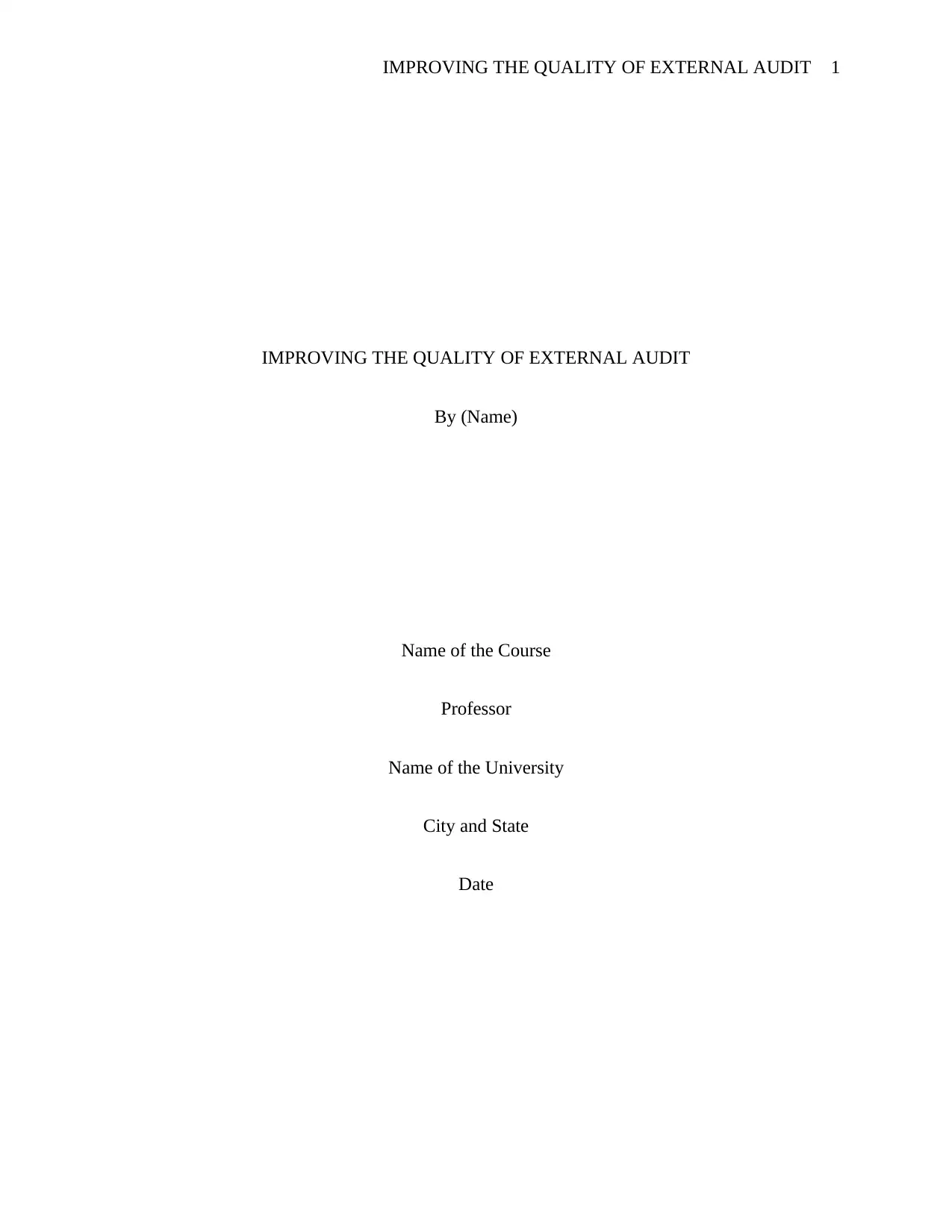
IMPROVING THE QUALITY OF EXTERNAL AUDIT 1
IMPROVING THE QUALITY OF EXTERNAL AUDIT
By (Name)
Name of the Course
Professor
Name of the University
City and State
Date
IMPROVING THE QUALITY OF EXTERNAL AUDIT
By (Name)
Name of the Course
Professor
Name of the University
City and State
Date
Paraphrase This Document
Need a fresh take? Get an instant paraphrase of this document with our AI Paraphraser
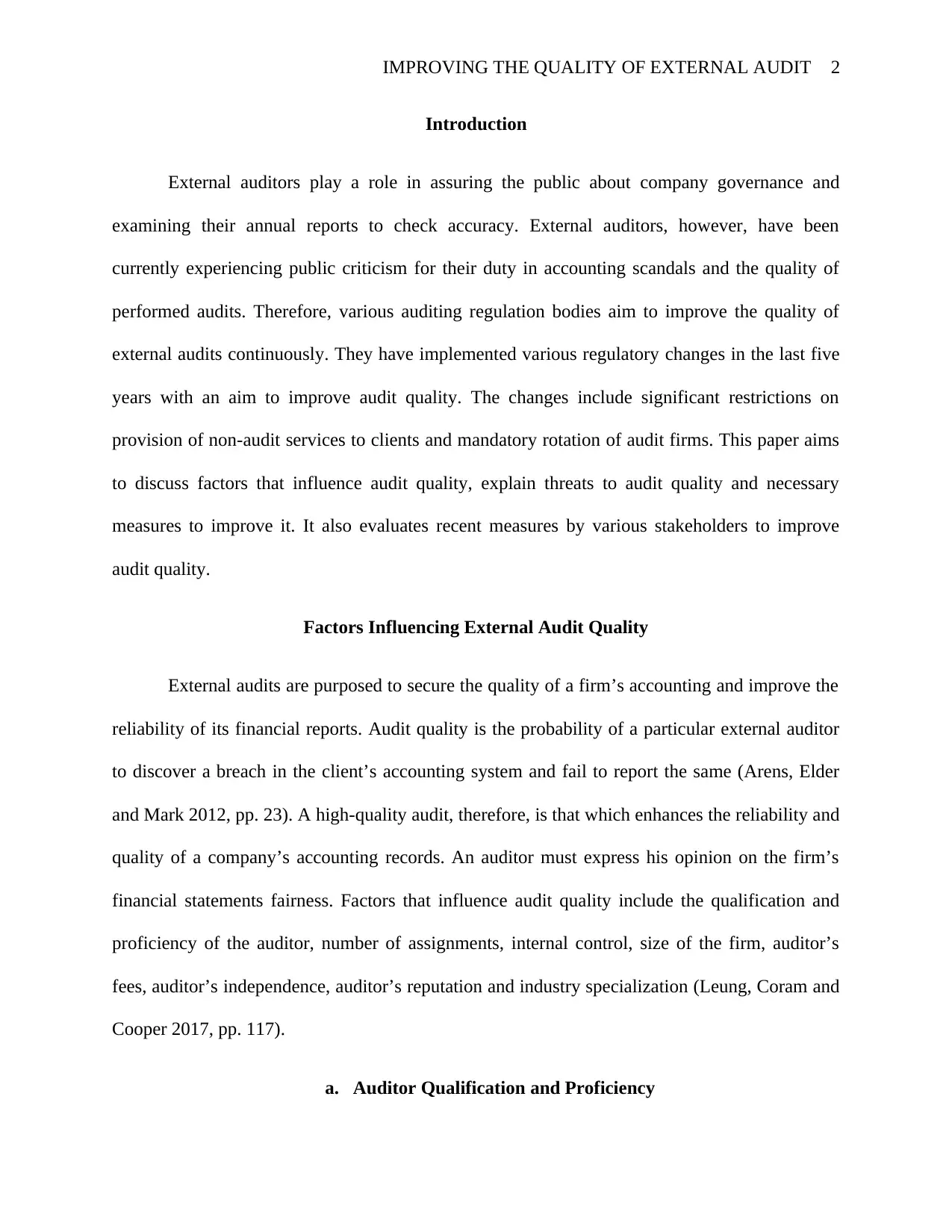
IMPROVING THE QUALITY OF EXTERNAL AUDIT 2
Introduction
External auditors play a role in assuring the public about company governance and
examining their annual reports to check accuracy. External auditors, however, have been
currently experiencing public criticism for their duty in accounting scandals and the quality of
performed audits. Therefore, various auditing regulation bodies aim to improve the quality of
external audits continuously. They have implemented various regulatory changes in the last five
years with an aim to improve audit quality. The changes include significant restrictions on
provision of non-audit services to clients and mandatory rotation of audit firms. This paper aims
to discuss factors that influence audit quality, explain threats to audit quality and necessary
measures to improve it. It also evaluates recent measures by various stakeholders to improve
audit quality.
Factors Influencing External Audit Quality
External audits are purposed to secure the quality of a firm’s accounting and improve the
reliability of its financial reports. Audit quality is the probability of a particular external auditor
to discover a breach in the client’s accounting system and fail to report the same (Arens, Elder
and Mark 2012, pp. 23). A high-quality audit, therefore, is that which enhances the reliability and
quality of a company’s accounting records. An auditor must express his opinion on the firm’s
financial statements fairness. Factors that influence audit quality include the qualification and
proficiency of the auditor, number of assignments, internal control, size of the firm, auditor’s
fees, auditor’s independence, auditor’s reputation and industry specialization (Leung, Coram and
Cooper 2017, pp. 117).
a. Auditor Qualification and Proficiency
Introduction
External auditors play a role in assuring the public about company governance and
examining their annual reports to check accuracy. External auditors, however, have been
currently experiencing public criticism for their duty in accounting scandals and the quality of
performed audits. Therefore, various auditing regulation bodies aim to improve the quality of
external audits continuously. They have implemented various regulatory changes in the last five
years with an aim to improve audit quality. The changes include significant restrictions on
provision of non-audit services to clients and mandatory rotation of audit firms. This paper aims
to discuss factors that influence audit quality, explain threats to audit quality and necessary
measures to improve it. It also evaluates recent measures by various stakeholders to improve
audit quality.
Factors Influencing External Audit Quality
External audits are purposed to secure the quality of a firm’s accounting and improve the
reliability of its financial reports. Audit quality is the probability of a particular external auditor
to discover a breach in the client’s accounting system and fail to report the same (Arens, Elder
and Mark 2012, pp. 23). A high-quality audit, therefore, is that which enhances the reliability and
quality of a company’s accounting records. An auditor must express his opinion on the firm’s
financial statements fairness. Factors that influence audit quality include the qualification and
proficiency of the auditor, number of assignments, internal control, size of the firm, auditor’s
fees, auditor’s independence, auditor’s reputation and industry specialization (Leung, Coram and
Cooper 2017, pp. 117).
a. Auditor Qualification and Proficiency
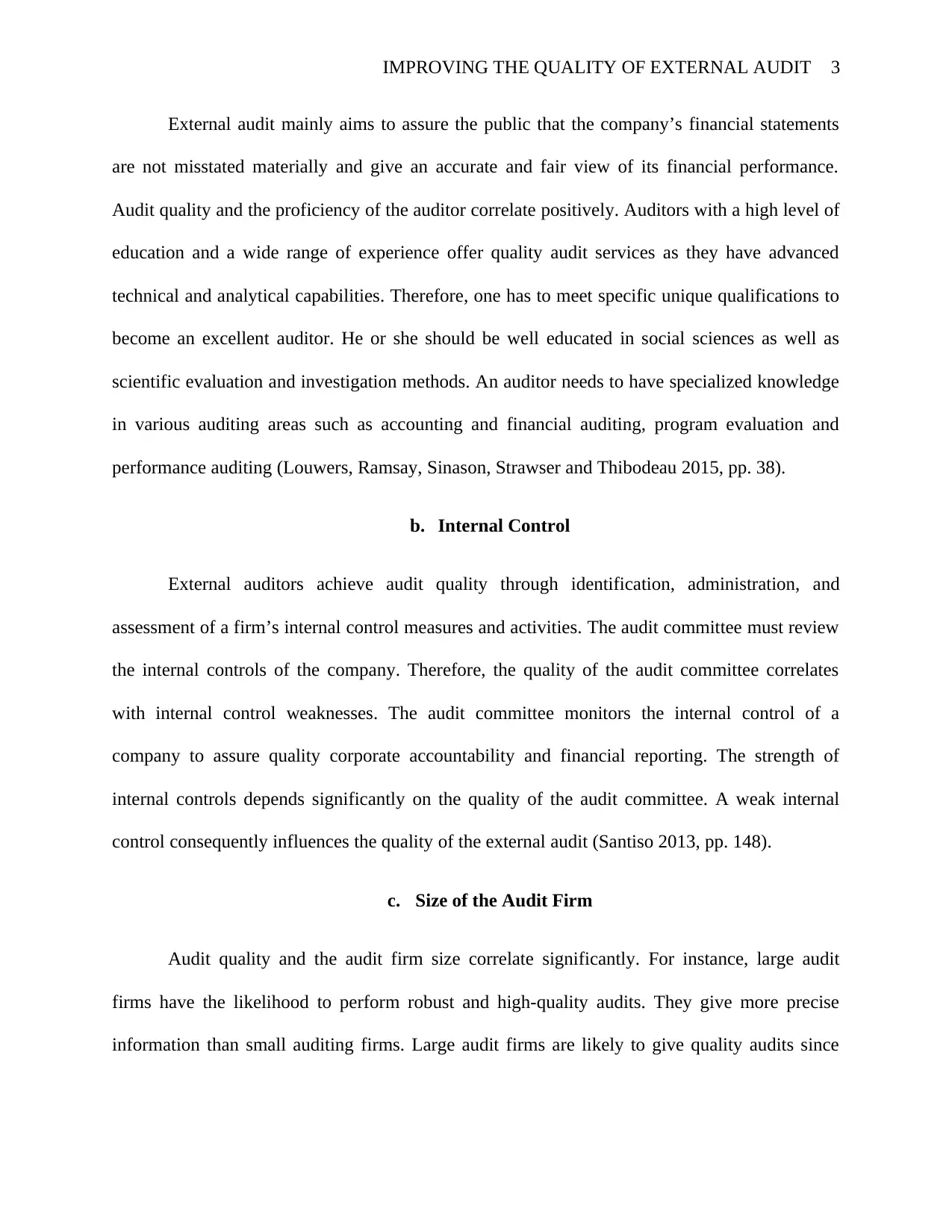
IMPROVING THE QUALITY OF EXTERNAL AUDIT 3
External audit mainly aims to assure the public that the company’s financial statements
are not misstated materially and give an accurate and fair view of its financial performance.
Audit quality and the proficiency of the auditor correlate positively. Auditors with a high level of
education and a wide range of experience offer quality audit services as they have advanced
technical and analytical capabilities. Therefore, one has to meet specific unique qualifications to
become an excellent auditor. He or she should be well educated in social sciences as well as
scientific evaluation and investigation methods. An auditor needs to have specialized knowledge
in various auditing areas such as accounting and financial auditing, program evaluation and
performance auditing (Louwers, Ramsay, Sinason, Strawser and Thibodeau 2015, pp. 38).
b. Internal Control
External auditors achieve audit quality through identification, administration, and
assessment of a firm’s internal control measures and activities. The audit committee must review
the internal controls of the company. Therefore, the quality of the audit committee correlates
with internal control weaknesses. The audit committee monitors the internal control of a
company to assure quality corporate accountability and financial reporting. The strength of
internal controls depends significantly on the quality of the audit committee. A weak internal
control consequently influences the quality of the external audit (Santiso 2013, pp. 148).
c. Size of the Audit Firm
Audit quality and the audit firm size correlate significantly. For instance, large audit
firms have the likelihood to perform robust and high-quality audits. They give more precise
information than small auditing firms. Large audit firms are likely to give quality audits since
External audit mainly aims to assure the public that the company’s financial statements
are not misstated materially and give an accurate and fair view of its financial performance.
Audit quality and the proficiency of the auditor correlate positively. Auditors with a high level of
education and a wide range of experience offer quality audit services as they have advanced
technical and analytical capabilities. Therefore, one has to meet specific unique qualifications to
become an excellent auditor. He or she should be well educated in social sciences as well as
scientific evaluation and investigation methods. An auditor needs to have specialized knowledge
in various auditing areas such as accounting and financial auditing, program evaluation and
performance auditing (Louwers, Ramsay, Sinason, Strawser and Thibodeau 2015, pp. 38).
b. Internal Control
External auditors achieve audit quality through identification, administration, and
assessment of a firm’s internal control measures and activities. The audit committee must review
the internal controls of the company. Therefore, the quality of the audit committee correlates
with internal control weaknesses. The audit committee monitors the internal control of a
company to assure quality corporate accountability and financial reporting. The strength of
internal controls depends significantly on the quality of the audit committee. A weak internal
control consequently influences the quality of the external audit (Santiso 2013, pp. 148).
c. Size of the Audit Firm
Audit quality and the audit firm size correlate significantly. For instance, large audit
firms have the likelihood to perform robust and high-quality audits. They give more precise
information than small auditing firms. Large audit firms are likely to give quality audits since
⊘ This is a preview!⊘
Do you want full access?
Subscribe today to unlock all pages.

Trusted by 1+ million students worldwide
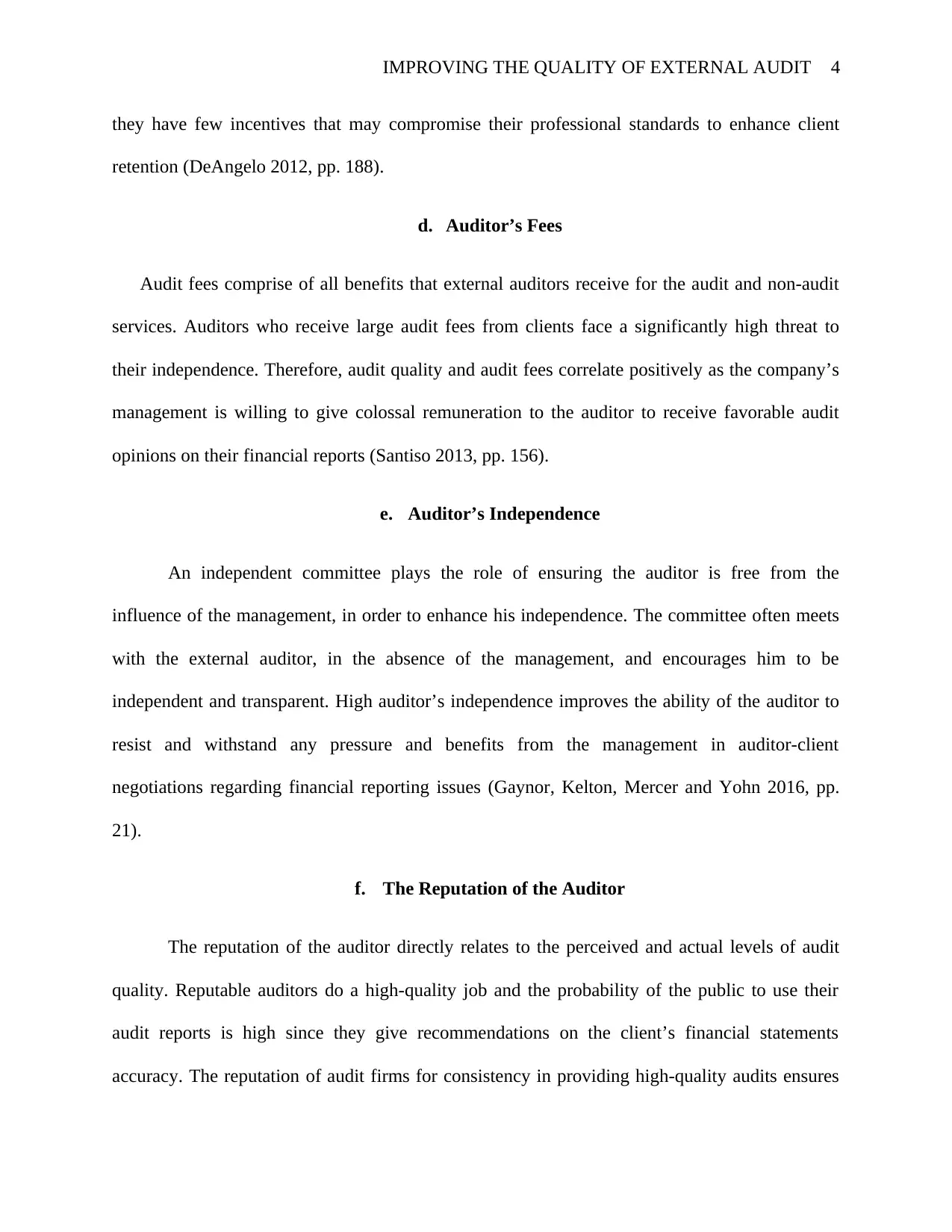
IMPROVING THE QUALITY OF EXTERNAL AUDIT 4
they have few incentives that may compromise their professional standards to enhance client
retention (DeAngelo 2012, pp. 188).
d. Auditor’s Fees
Audit fees comprise of all benefits that external auditors receive for the audit and non-audit
services. Auditors who receive large audit fees from clients face a significantly high threat to
their independence. Therefore, audit quality and audit fees correlate positively as the company’s
management is willing to give colossal remuneration to the auditor to receive favorable audit
opinions on their financial reports (Santiso 2013, pp. 156).
e. Auditor’s Independence
An independent committee plays the role of ensuring the auditor is free from the
influence of the management, in order to enhance his independence. The committee often meets
with the external auditor, in the absence of the management, and encourages him to be
independent and transparent. High auditor’s independence improves the ability of the auditor to
resist and withstand any pressure and benefits from the management in auditor-client
negotiations regarding financial reporting issues (Gaynor, Kelton, Mercer and Yohn 2016, pp.
21).
f. The Reputation of the Auditor
The reputation of the auditor directly relates to the perceived and actual levels of audit
quality. Reputable auditors do a high-quality job and the probability of the public to use their
audit reports is high since they give recommendations on the client’s financial statements
accuracy. The reputation of audit firms for consistency in providing high-quality audits ensures
they have few incentives that may compromise their professional standards to enhance client
retention (DeAngelo 2012, pp. 188).
d. Auditor’s Fees
Audit fees comprise of all benefits that external auditors receive for the audit and non-audit
services. Auditors who receive large audit fees from clients face a significantly high threat to
their independence. Therefore, audit quality and audit fees correlate positively as the company’s
management is willing to give colossal remuneration to the auditor to receive favorable audit
opinions on their financial reports (Santiso 2013, pp. 156).
e. Auditor’s Independence
An independent committee plays the role of ensuring the auditor is free from the
influence of the management, in order to enhance his independence. The committee often meets
with the external auditor, in the absence of the management, and encourages him to be
independent and transparent. High auditor’s independence improves the ability of the auditor to
resist and withstand any pressure and benefits from the management in auditor-client
negotiations regarding financial reporting issues (Gaynor, Kelton, Mercer and Yohn 2016, pp.
21).
f. The Reputation of the Auditor
The reputation of the auditor directly relates to the perceived and actual levels of audit
quality. Reputable auditors do a high-quality job and the probability of the public to use their
audit reports is high since they give recommendations on the client’s financial statements
accuracy. The reputation of audit firms for consistency in providing high-quality audits ensures
Paraphrase This Document
Need a fresh take? Get an instant paraphrase of this document with our AI Paraphraser
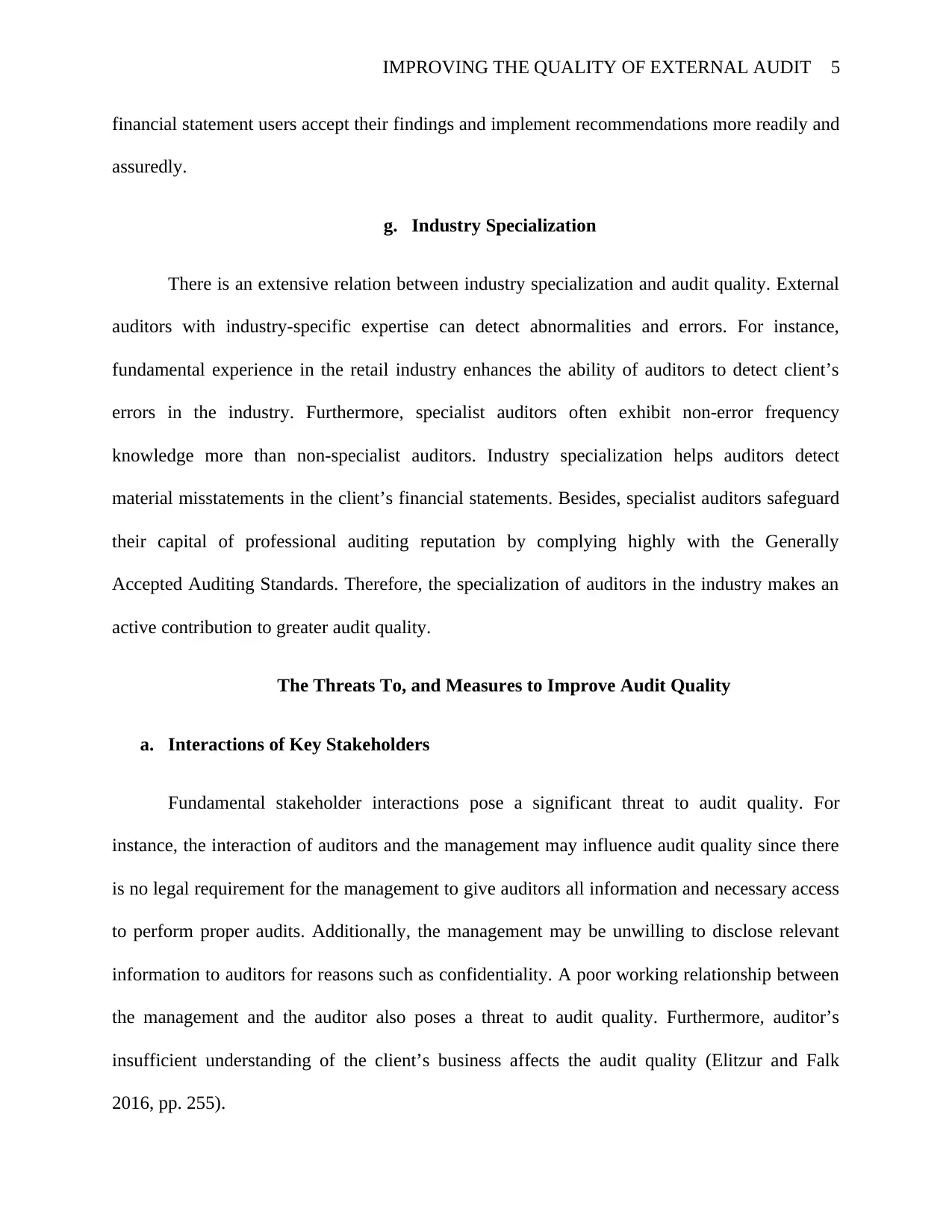
IMPROVING THE QUALITY OF EXTERNAL AUDIT 5
financial statement users accept their findings and implement recommendations more readily and
assuredly.
g. Industry Specialization
There is an extensive relation between industry specialization and audit quality. External
auditors with industry-specific expertise can detect abnormalities and errors. For instance,
fundamental experience in the retail industry enhances the ability of auditors to detect client’s
errors in the industry. Furthermore, specialist auditors often exhibit non-error frequency
knowledge more than non-specialist auditors. Industry specialization helps auditors detect
material misstatements in the client’s financial statements. Besides, specialist auditors safeguard
their capital of professional auditing reputation by complying highly with the Generally
Accepted Auditing Standards. Therefore, the specialization of auditors in the industry makes an
active contribution to greater audit quality.
The Threats To, and Measures to Improve Audit Quality
a. Interactions of Key Stakeholders
Fundamental stakeholder interactions pose a significant threat to audit quality. For
instance, the interaction of auditors and the management may influence audit quality since there
is no legal requirement for the management to give auditors all information and necessary access
to perform proper audits. Additionally, the management may be unwilling to disclose relevant
information to auditors for reasons such as confidentiality. A poor working relationship between
the management and the auditor also poses a threat to audit quality. Furthermore, auditor’s
insufficient understanding of the client’s business affects the audit quality (Elitzur and Falk
2016, pp. 255).
financial statement users accept their findings and implement recommendations more readily and
assuredly.
g. Industry Specialization
There is an extensive relation between industry specialization and audit quality. External
auditors with industry-specific expertise can detect abnormalities and errors. For instance,
fundamental experience in the retail industry enhances the ability of auditors to detect client’s
errors in the industry. Furthermore, specialist auditors often exhibit non-error frequency
knowledge more than non-specialist auditors. Industry specialization helps auditors detect
material misstatements in the client’s financial statements. Besides, specialist auditors safeguard
their capital of professional auditing reputation by complying highly with the Generally
Accepted Auditing Standards. Therefore, the specialization of auditors in the industry makes an
active contribution to greater audit quality.
The Threats To, and Measures to Improve Audit Quality
a. Interactions of Key Stakeholders
Fundamental stakeholder interactions pose a significant threat to audit quality. For
instance, the interaction of auditors and the management may influence audit quality since there
is no legal requirement for the management to give auditors all information and necessary access
to perform proper audits. Additionally, the management may be unwilling to disclose relevant
information to auditors for reasons such as confidentiality. A poor working relationship between
the management and the auditor also poses a threat to audit quality. Furthermore, auditor’s
insufficient understanding of the client’s business affects the audit quality (Elitzur and Falk
2016, pp. 255).
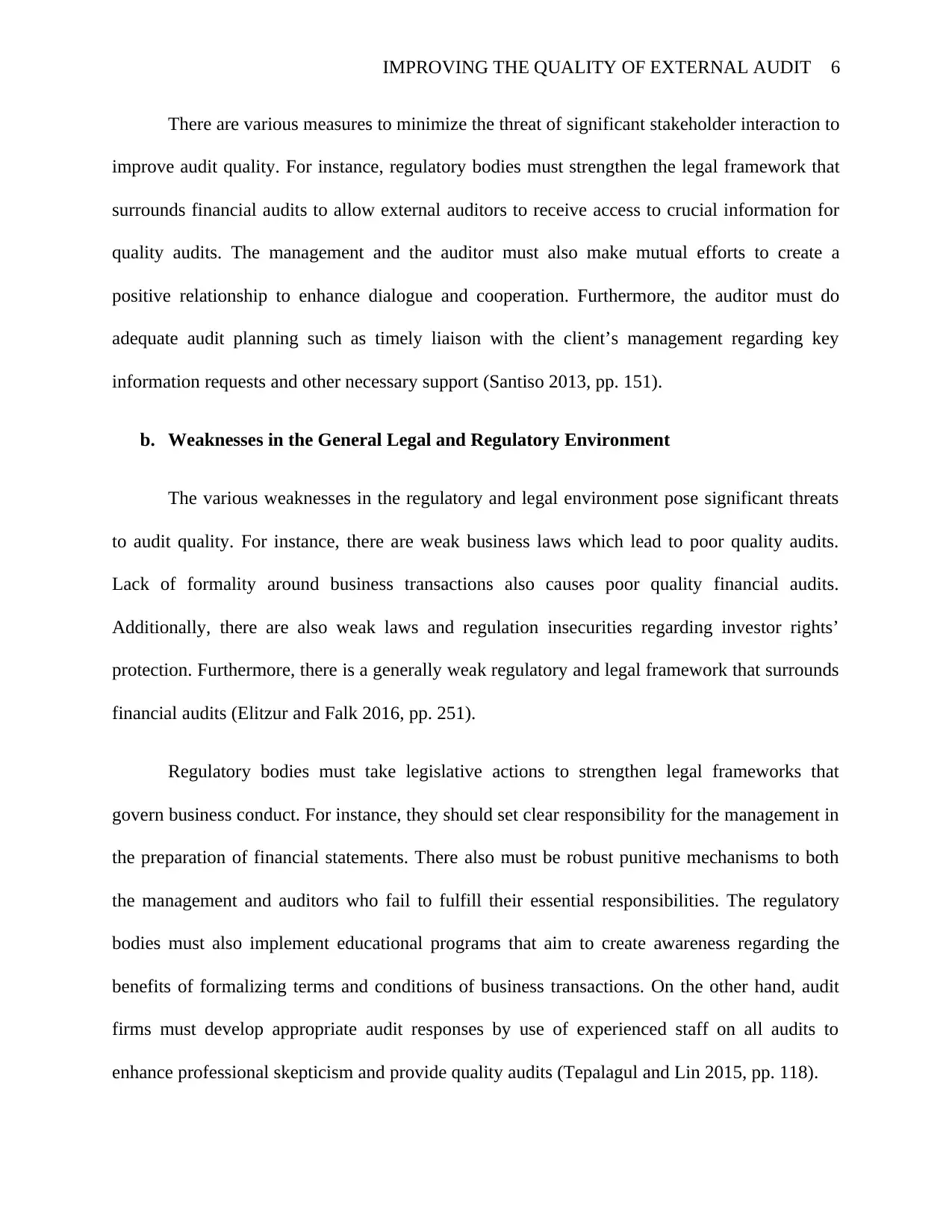
IMPROVING THE QUALITY OF EXTERNAL AUDIT 6
There are various measures to minimize the threat of significant stakeholder interaction to
improve audit quality. For instance, regulatory bodies must strengthen the legal framework that
surrounds financial audits to allow external auditors to receive access to crucial information for
quality audits. The management and the auditor must also make mutual efforts to create a
positive relationship to enhance dialogue and cooperation. Furthermore, the auditor must do
adequate audit planning such as timely liaison with the client’s management regarding key
information requests and other necessary support (Santiso 2013, pp. 151).
b. Weaknesses in the General Legal and Regulatory Environment
The various weaknesses in the regulatory and legal environment pose significant threats
to audit quality. For instance, there are weak business laws which lead to poor quality audits.
Lack of formality around business transactions also causes poor quality financial audits.
Additionally, there are also weak laws and regulation insecurities regarding investor rights’
protection. Furthermore, there is a generally weak regulatory and legal framework that surrounds
financial audits (Elitzur and Falk 2016, pp. 251).
Regulatory bodies must take legislative actions to strengthen legal frameworks that
govern business conduct. For instance, they should set clear responsibility for the management in
the preparation of financial statements. There also must be robust punitive mechanisms to both
the management and auditors who fail to fulfill their essential responsibilities. The regulatory
bodies must also implement educational programs that aim to create awareness regarding the
benefits of formalizing terms and conditions of business transactions. On the other hand, audit
firms must develop appropriate audit responses by use of experienced staff on all audits to
enhance professional skepticism and provide quality audits (Tepalagul and Lin 2015, pp. 118).
There are various measures to minimize the threat of significant stakeholder interaction to
improve audit quality. For instance, regulatory bodies must strengthen the legal framework that
surrounds financial audits to allow external auditors to receive access to crucial information for
quality audits. The management and the auditor must also make mutual efforts to create a
positive relationship to enhance dialogue and cooperation. Furthermore, the auditor must do
adequate audit planning such as timely liaison with the client’s management regarding key
information requests and other necessary support (Santiso 2013, pp. 151).
b. Weaknesses in the General Legal and Regulatory Environment
The various weaknesses in the regulatory and legal environment pose significant threats
to audit quality. For instance, there are weak business laws which lead to poor quality audits.
Lack of formality around business transactions also causes poor quality financial audits.
Additionally, there are also weak laws and regulation insecurities regarding investor rights’
protection. Furthermore, there is a generally weak regulatory and legal framework that surrounds
financial audits (Elitzur and Falk 2016, pp. 251).
Regulatory bodies must take legislative actions to strengthen legal frameworks that
govern business conduct. For instance, they should set clear responsibility for the management in
the preparation of financial statements. There also must be robust punitive mechanisms to both
the management and auditors who fail to fulfill their essential responsibilities. The regulatory
bodies must also implement educational programs that aim to create awareness regarding the
benefits of formalizing terms and conditions of business transactions. On the other hand, audit
firms must develop appropriate audit responses by use of experienced staff on all audits to
enhance professional skepticism and provide quality audits (Tepalagul and Lin 2015, pp. 118).
⊘ This is a preview!⊘
Do you want full access?
Subscribe today to unlock all pages.

Trusted by 1+ million students worldwide
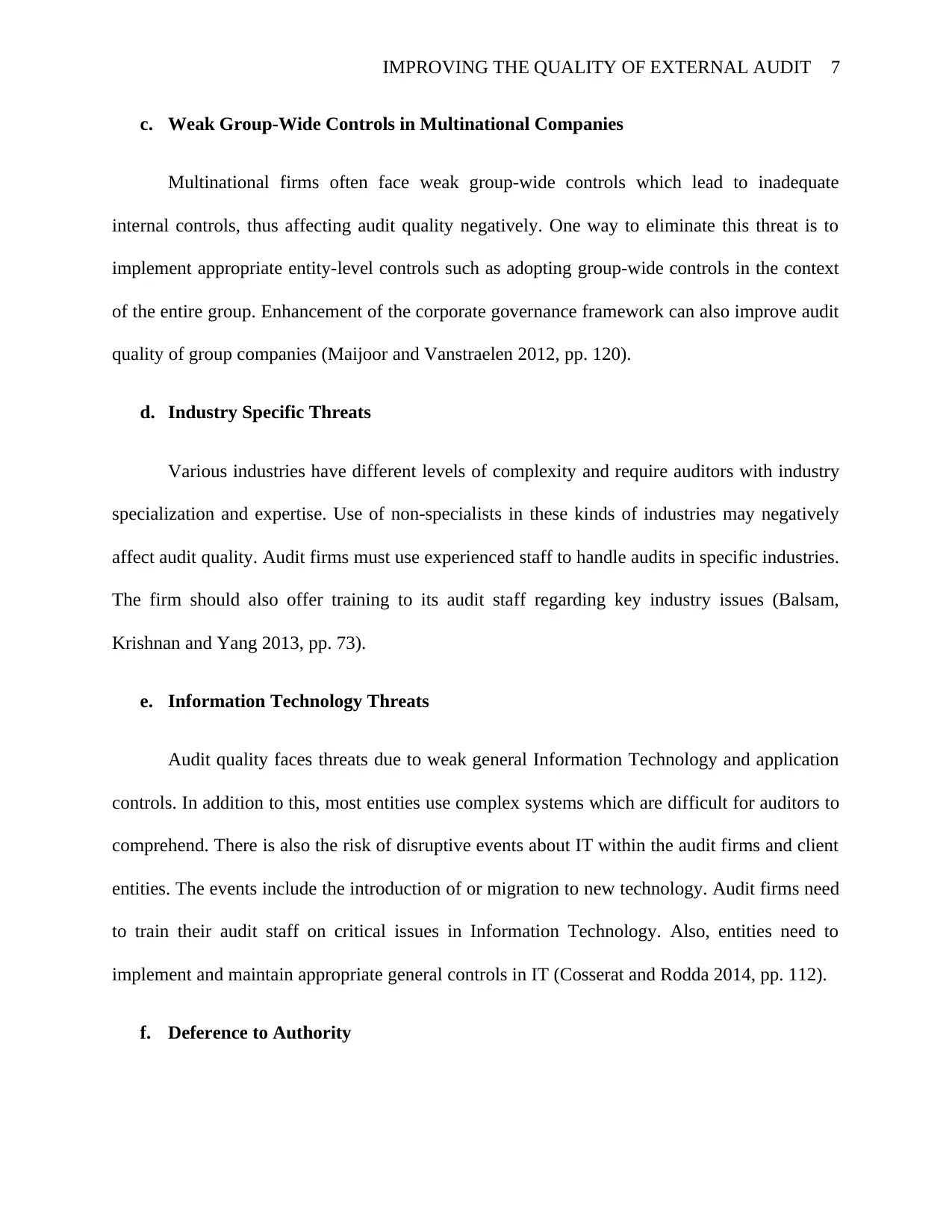
IMPROVING THE QUALITY OF EXTERNAL AUDIT 7
c. Weak Group-Wide Controls in Multinational Companies
Multinational firms often face weak group-wide controls which lead to inadequate
internal controls, thus affecting audit quality negatively. One way to eliminate this threat is to
implement appropriate entity-level controls such as adopting group-wide controls in the context
of the entire group. Enhancement of the corporate governance framework can also improve audit
quality of group companies (Maijoor and Vanstraelen 2012, pp. 120).
d. Industry Specific Threats
Various industries have different levels of complexity and require auditors with industry
specialization and expertise. Use of non-specialists in these kinds of industries may negatively
affect audit quality. Audit firms must use experienced staff to handle audits in specific industries.
The firm should also offer training to its audit staff regarding key industry issues (Balsam,
Krishnan and Yang 2013, pp. 73).
e. Information Technology Threats
Audit quality faces threats due to weak general Information Technology and application
controls. In addition to this, most entities use complex systems which are difficult for auditors to
comprehend. There is also the risk of disruptive events about IT within the audit firms and client
entities. The events include the introduction of or migration to new technology. Audit firms need
to train their audit staff on critical issues in Information Technology. Also, entities need to
implement and maintain appropriate general controls in IT (Cosserat and Rodda 2014, pp. 112).
f. Deference to Authority
c. Weak Group-Wide Controls in Multinational Companies
Multinational firms often face weak group-wide controls which lead to inadequate
internal controls, thus affecting audit quality negatively. One way to eliminate this threat is to
implement appropriate entity-level controls such as adopting group-wide controls in the context
of the entire group. Enhancement of the corporate governance framework can also improve audit
quality of group companies (Maijoor and Vanstraelen 2012, pp. 120).
d. Industry Specific Threats
Various industries have different levels of complexity and require auditors with industry
specialization and expertise. Use of non-specialists in these kinds of industries may negatively
affect audit quality. Audit firms must use experienced staff to handle audits in specific industries.
The firm should also offer training to its audit staff regarding key industry issues (Balsam,
Krishnan and Yang 2013, pp. 73).
e. Information Technology Threats
Audit quality faces threats due to weak general Information Technology and application
controls. In addition to this, most entities use complex systems which are difficult for auditors to
comprehend. There is also the risk of disruptive events about IT within the audit firms and client
entities. The events include the introduction of or migration to new technology. Audit firms need
to train their audit staff on critical issues in Information Technology. Also, entities need to
implement and maintain appropriate general controls in IT (Cosserat and Rodda 2014, pp. 112).
f. Deference to Authority
Paraphrase This Document
Need a fresh take? Get an instant paraphrase of this document with our AI Paraphraser
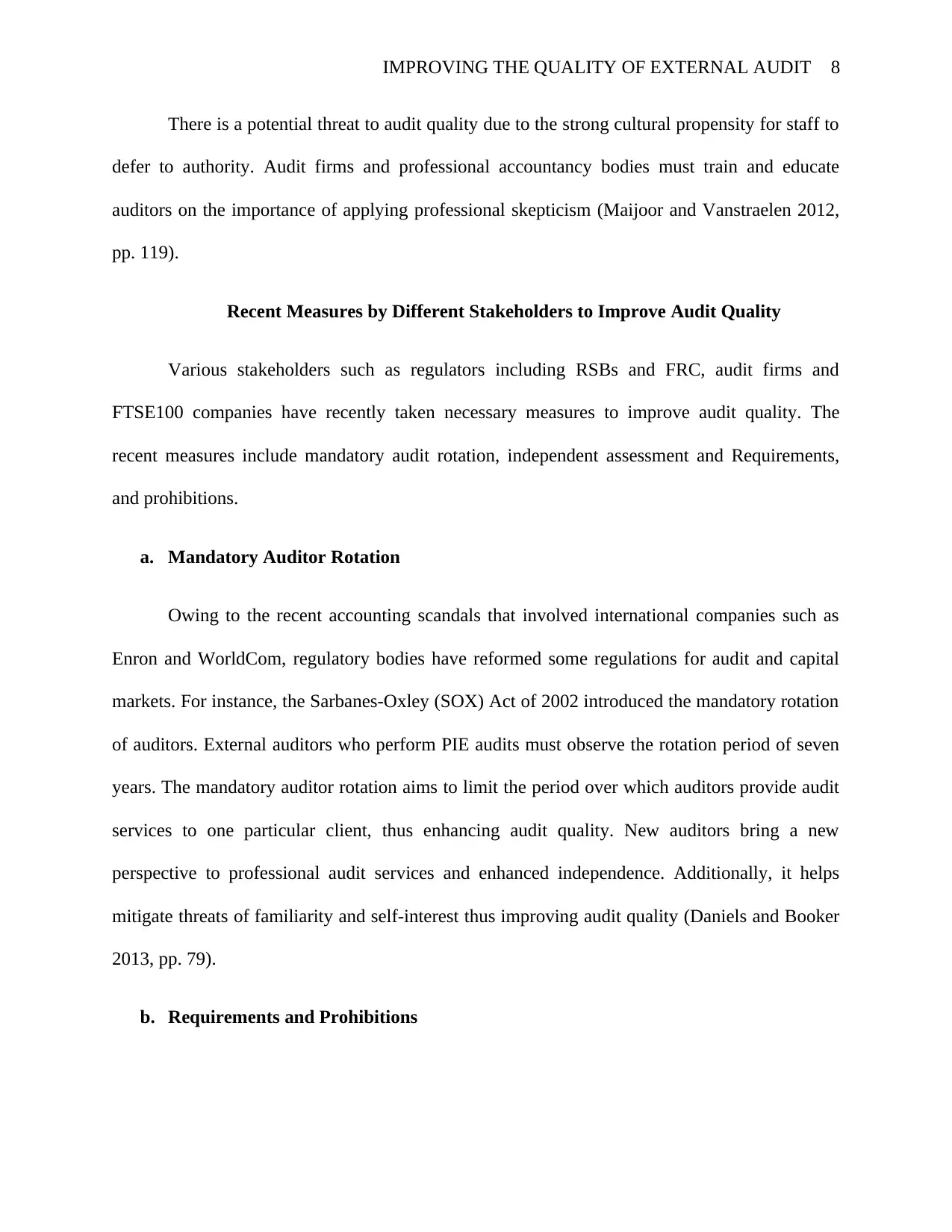
IMPROVING THE QUALITY OF EXTERNAL AUDIT 8
There is a potential threat to audit quality due to the strong cultural propensity for staff to
defer to authority. Audit firms and professional accountancy bodies must train and educate
auditors on the importance of applying professional skepticism (Maijoor and Vanstraelen 2012,
pp. 119).
Recent Measures by Different Stakeholders to Improve Audit Quality
Various stakeholders such as regulators including RSBs and FRC, audit firms and
FTSE100 companies have recently taken necessary measures to improve audit quality. The
recent measures include mandatory audit rotation, independent assessment and Requirements,
and prohibitions.
a. Mandatory Auditor Rotation
Owing to the recent accounting scandals that involved international companies such as
Enron and WorldCom, regulatory bodies have reformed some regulations for audit and capital
markets. For instance, the Sarbanes-Oxley (SOX) Act of 2002 introduced the mandatory rotation
of auditors. External auditors who perform PIE audits must observe the rotation period of seven
years. The mandatory auditor rotation aims to limit the period over which auditors provide audit
services to one particular client, thus enhancing audit quality. New auditors bring a new
perspective to professional audit services and enhanced independence. Additionally, it helps
mitigate threats of familiarity and self-interest thus improving audit quality (Daniels and Booker
2013, pp. 79).
b. Requirements and Prohibitions
There is a potential threat to audit quality due to the strong cultural propensity for staff to
defer to authority. Audit firms and professional accountancy bodies must train and educate
auditors on the importance of applying professional skepticism (Maijoor and Vanstraelen 2012,
pp. 119).
Recent Measures by Different Stakeholders to Improve Audit Quality
Various stakeholders such as regulators including RSBs and FRC, audit firms and
FTSE100 companies have recently taken necessary measures to improve audit quality. The
recent measures include mandatory audit rotation, independent assessment and Requirements,
and prohibitions.
a. Mandatory Auditor Rotation
Owing to the recent accounting scandals that involved international companies such as
Enron and WorldCom, regulatory bodies have reformed some regulations for audit and capital
markets. For instance, the Sarbanes-Oxley (SOX) Act of 2002 introduced the mandatory rotation
of auditors. External auditors who perform PIE audits must observe the rotation period of seven
years. The mandatory auditor rotation aims to limit the period over which auditors provide audit
services to one particular client, thus enhancing audit quality. New auditors bring a new
perspective to professional audit services and enhanced independence. Additionally, it helps
mitigate threats of familiarity and self-interest thus improving audit quality (Daniels and Booker
2013, pp. 79).
b. Requirements and Prohibitions
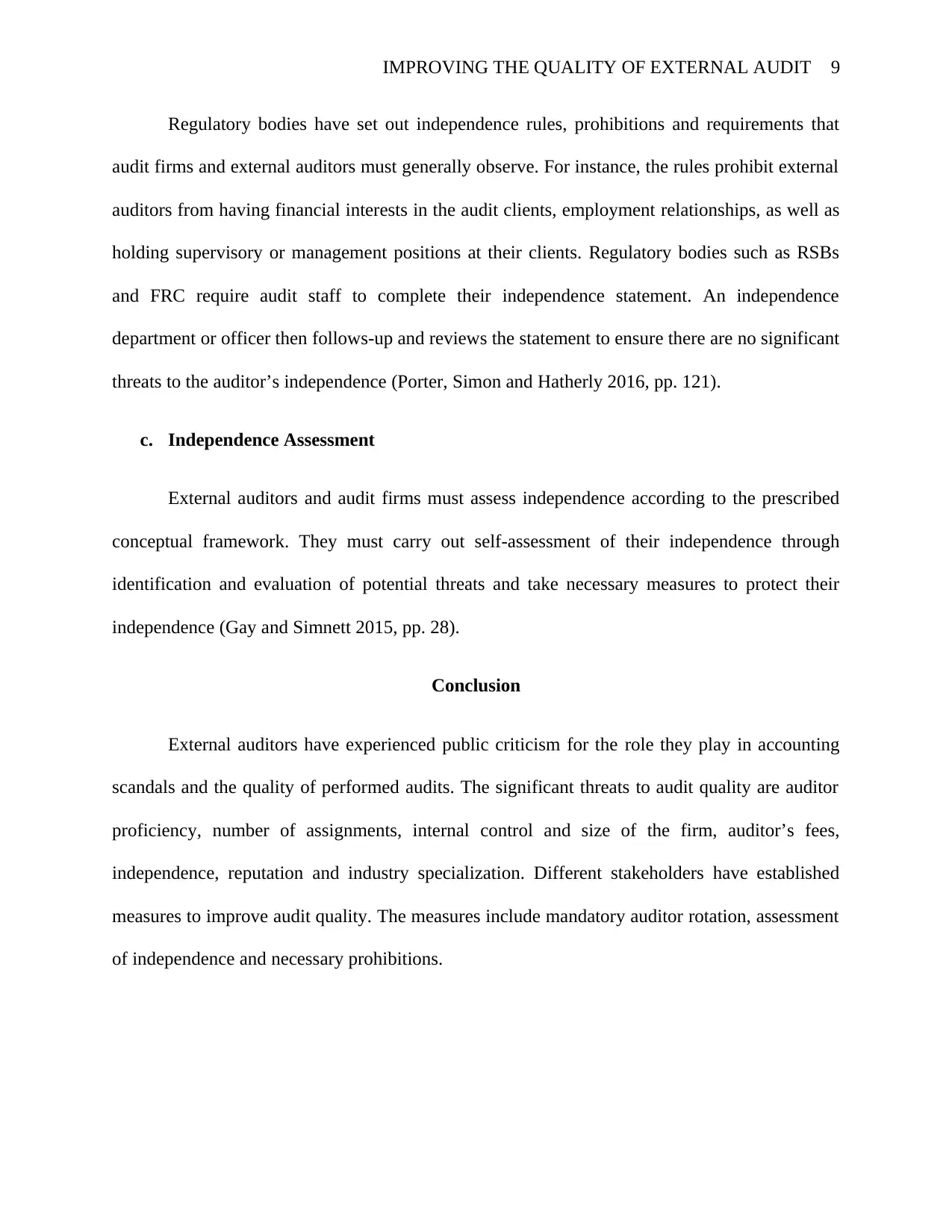
IMPROVING THE QUALITY OF EXTERNAL AUDIT 9
Regulatory bodies have set out independence rules, prohibitions and requirements that
audit firms and external auditors must generally observe. For instance, the rules prohibit external
auditors from having financial interests in the audit clients, employment relationships, as well as
holding supervisory or management positions at their clients. Regulatory bodies such as RSBs
and FRC require audit staff to complete their independence statement. An independence
department or officer then follows-up and reviews the statement to ensure there are no significant
threats to the auditor’s independence (Porter, Simon and Hatherly 2016, pp. 121).
c. Independence Assessment
External auditors and audit firms must assess independence according to the prescribed
conceptual framework. They must carry out self-assessment of their independence through
identification and evaluation of potential threats and take necessary measures to protect their
independence (Gay and Simnett 2015, pp. 28).
Conclusion
External auditors have experienced public criticism for the role they play in accounting
scandals and the quality of performed audits. The significant threats to audit quality are auditor
proficiency, number of assignments, internal control and size of the firm, auditor’s fees,
independence, reputation and industry specialization. Different stakeholders have established
measures to improve audit quality. The measures include mandatory auditor rotation, assessment
of independence and necessary prohibitions.
Regulatory bodies have set out independence rules, prohibitions and requirements that
audit firms and external auditors must generally observe. For instance, the rules prohibit external
auditors from having financial interests in the audit clients, employment relationships, as well as
holding supervisory or management positions at their clients. Regulatory bodies such as RSBs
and FRC require audit staff to complete their independence statement. An independence
department or officer then follows-up and reviews the statement to ensure there are no significant
threats to the auditor’s independence (Porter, Simon and Hatherly 2016, pp. 121).
c. Independence Assessment
External auditors and audit firms must assess independence according to the prescribed
conceptual framework. They must carry out self-assessment of their independence through
identification and evaluation of potential threats and take necessary measures to protect their
independence (Gay and Simnett 2015, pp. 28).
Conclusion
External auditors have experienced public criticism for the role they play in accounting
scandals and the quality of performed audits. The significant threats to audit quality are auditor
proficiency, number of assignments, internal control and size of the firm, auditor’s fees,
independence, reputation and industry specialization. Different stakeholders have established
measures to improve audit quality. The measures include mandatory auditor rotation, assessment
of independence and necessary prohibitions.
⊘ This is a preview!⊘
Do you want full access?
Subscribe today to unlock all pages.

Trusted by 1+ million students worldwide
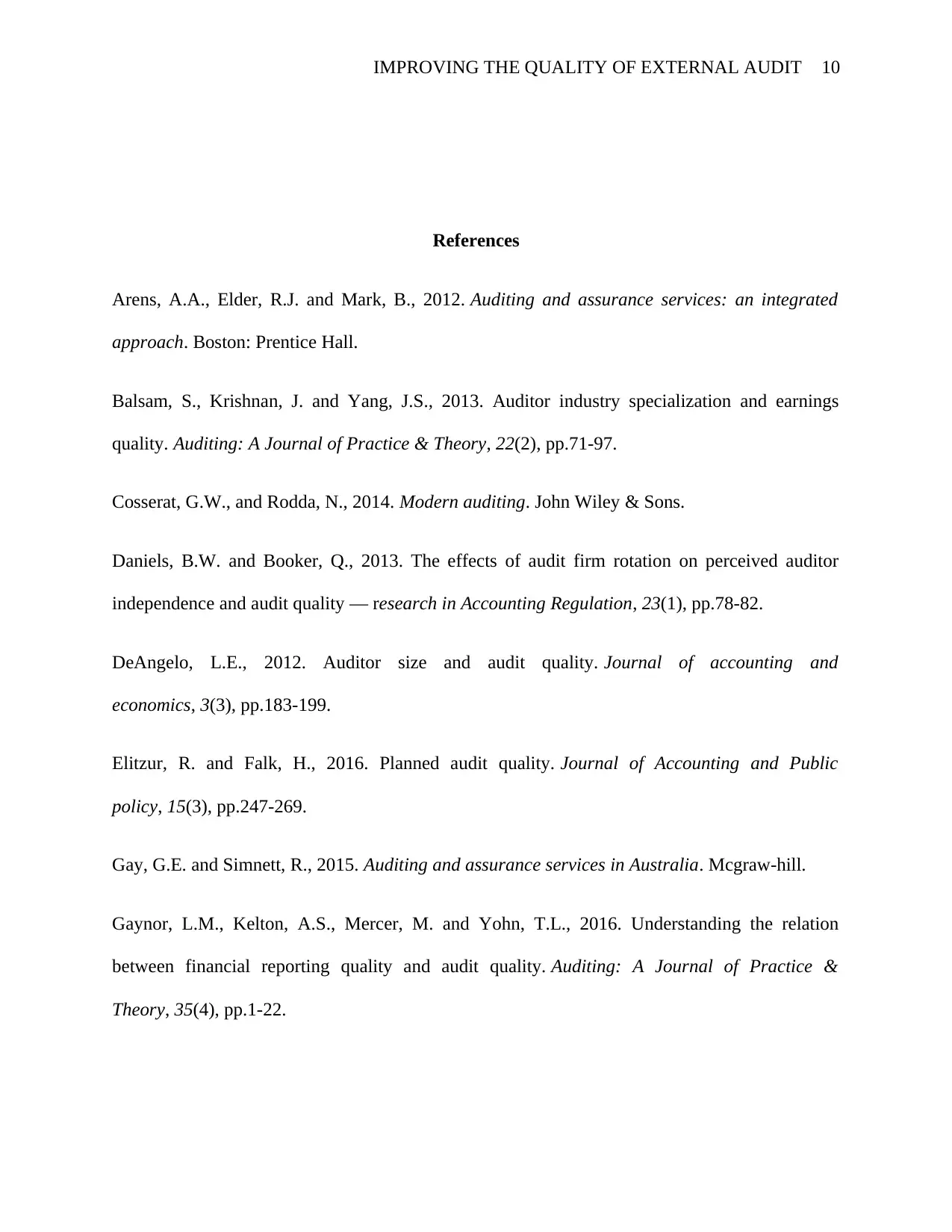
IMPROVING THE QUALITY OF EXTERNAL AUDIT 10
References
Arens, A.A., Elder, R.J. and Mark, B., 2012. Auditing and assurance services: an integrated
approach. Boston: Prentice Hall.
Balsam, S., Krishnan, J. and Yang, J.S., 2013. Auditor industry specialization and earnings
quality. Auditing: A Journal of Practice & Theory, 22(2), pp.71-97.
Cosserat, G.W., and Rodda, N., 2014. Modern auditing. John Wiley & Sons.
Daniels, B.W. and Booker, Q., 2013. The effects of audit firm rotation on perceived auditor
independence and audit quality — research in Accounting Regulation, 23(1), pp.78-82.
DeAngelo, L.E., 2012. Auditor size and audit quality. Journal of accounting and
economics, 3(3), pp.183-199.
Elitzur, R. and Falk, H., 2016. Planned audit quality. Journal of Accounting and Public
policy, 15(3), pp.247-269.
Gay, G.E. and Simnett, R., 2015. Auditing and assurance services in Australia. Mcgraw-hill.
Gaynor, L.M., Kelton, A.S., Mercer, M. and Yohn, T.L., 2016. Understanding the relation
between financial reporting quality and audit quality. Auditing: A Journal of Practice &
Theory, 35(4), pp.1-22.
References
Arens, A.A., Elder, R.J. and Mark, B., 2012. Auditing and assurance services: an integrated
approach. Boston: Prentice Hall.
Balsam, S., Krishnan, J. and Yang, J.S., 2013. Auditor industry specialization and earnings
quality. Auditing: A Journal of Practice & Theory, 22(2), pp.71-97.
Cosserat, G.W., and Rodda, N., 2014. Modern auditing. John Wiley & Sons.
Daniels, B.W. and Booker, Q., 2013. The effects of audit firm rotation on perceived auditor
independence and audit quality — research in Accounting Regulation, 23(1), pp.78-82.
DeAngelo, L.E., 2012. Auditor size and audit quality. Journal of accounting and
economics, 3(3), pp.183-199.
Elitzur, R. and Falk, H., 2016. Planned audit quality. Journal of Accounting and Public
policy, 15(3), pp.247-269.
Gay, G.E. and Simnett, R., 2015. Auditing and assurance services in Australia. Mcgraw-hill.
Gaynor, L.M., Kelton, A.S., Mercer, M. and Yohn, T.L., 2016. Understanding the relation
between financial reporting quality and audit quality. Auditing: A Journal of Practice &
Theory, 35(4), pp.1-22.
Paraphrase This Document
Need a fresh take? Get an instant paraphrase of this document with our AI Paraphraser
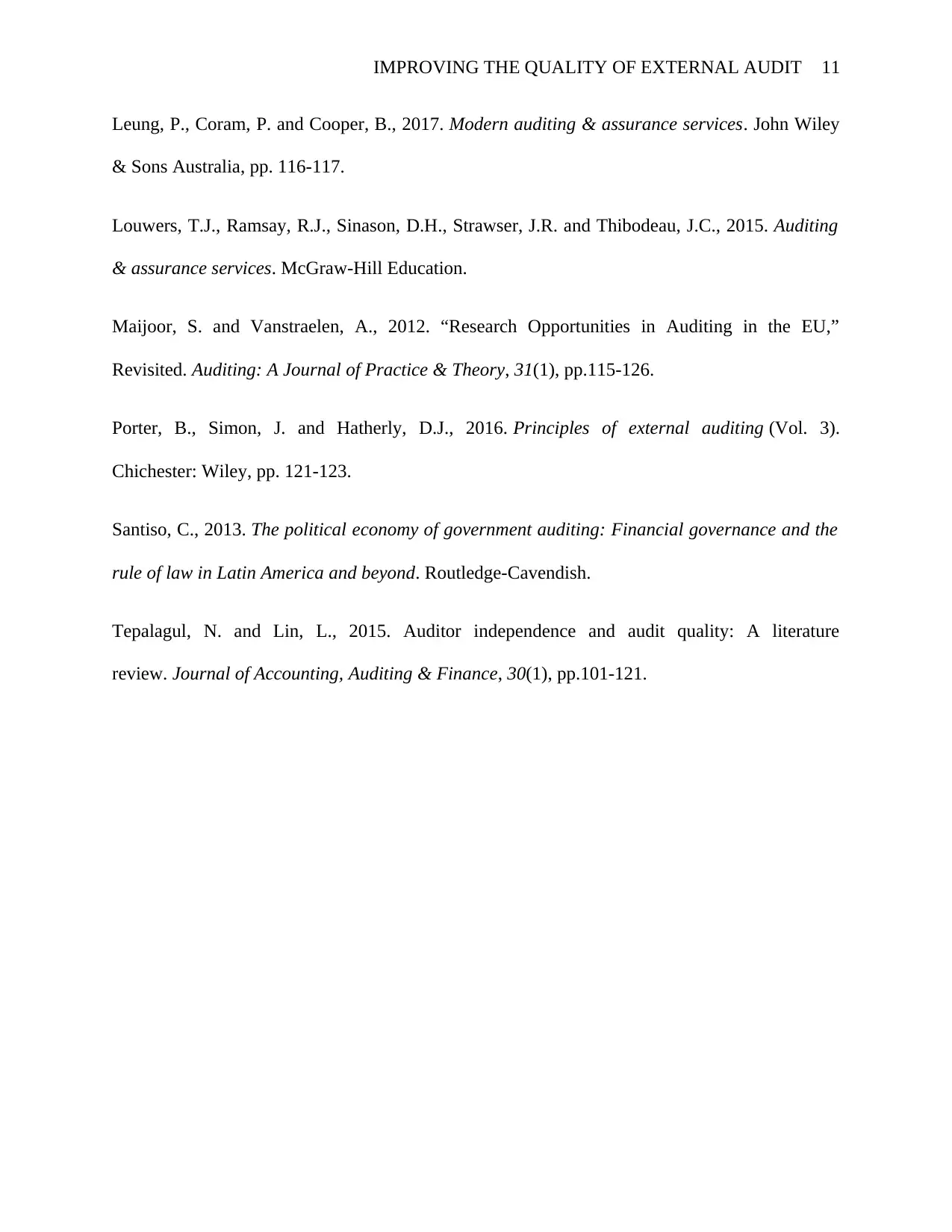
IMPROVING THE QUALITY OF EXTERNAL AUDIT 11
Leung, P., Coram, P. and Cooper, B., 2017. Modern auditing & assurance services. John Wiley
& Sons Australia, pp. 116-117.
Louwers, T.J., Ramsay, R.J., Sinason, D.H., Strawser, J.R. and Thibodeau, J.C., 2015. Auditing
& assurance services. McGraw-Hill Education.
Maijoor, S. and Vanstraelen, A., 2012. “Research Opportunities in Auditing in the EU,”
Revisited. Auditing: A Journal of Practice & Theory, 31(1), pp.115-126.
Porter, B., Simon, J. and Hatherly, D.J., 2016. Principles of external auditing (Vol. 3).
Chichester: Wiley, pp. 121-123.
Santiso, C., 2013. The political economy of government auditing: Financial governance and the
rule of law in Latin America and beyond. Routledge-Cavendish.
Tepalagul, N. and Lin, L., 2015. Auditor independence and audit quality: A literature
review. Journal of Accounting, Auditing & Finance, 30(1), pp.101-121.
Leung, P., Coram, P. and Cooper, B., 2017. Modern auditing & assurance services. John Wiley
& Sons Australia, pp. 116-117.
Louwers, T.J., Ramsay, R.J., Sinason, D.H., Strawser, J.R. and Thibodeau, J.C., 2015. Auditing
& assurance services. McGraw-Hill Education.
Maijoor, S. and Vanstraelen, A., 2012. “Research Opportunities in Auditing in the EU,”
Revisited. Auditing: A Journal of Practice & Theory, 31(1), pp.115-126.
Porter, B., Simon, J. and Hatherly, D.J., 2016. Principles of external auditing (Vol. 3).
Chichester: Wiley, pp. 121-123.
Santiso, C., 2013. The political economy of government auditing: Financial governance and the
rule of law in Latin America and beyond. Routledge-Cavendish.
Tepalagul, N. and Lin, L., 2015. Auditor independence and audit quality: A literature
review. Journal of Accounting, Auditing & Finance, 30(1), pp.101-121.
1 out of 11
Related Documents
Your All-in-One AI-Powered Toolkit for Academic Success.
+13062052269
info@desklib.com
Available 24*7 on WhatsApp / Email
![[object Object]](/_next/static/media/star-bottom.7253800d.svg)
Unlock your academic potential
Copyright © 2020–2025 A2Z Services. All Rights Reserved. Developed and managed by ZUCOL.





